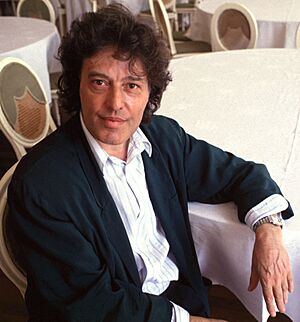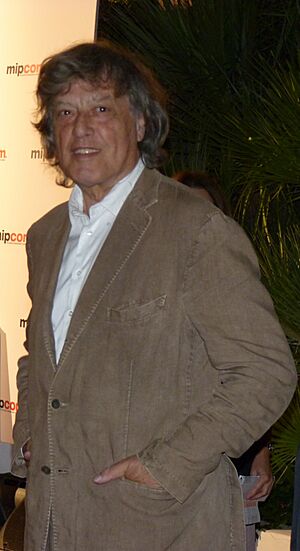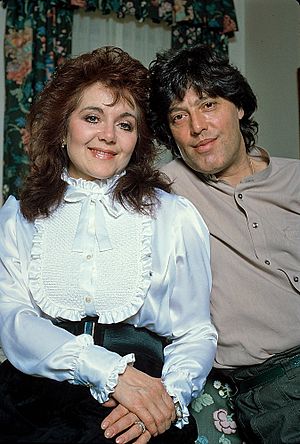Tom Stoppard facts for kids
Quick facts for kids
Sir
Tom Stoppard
|
|
|---|---|
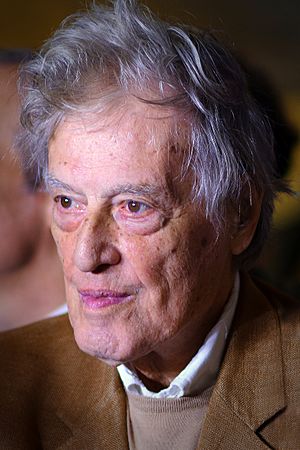
Stoppard in 2022
|
|
| Born | Tomáš Sträussler 3 July 1937 Zlín, Czechoslovakia (present day Czech Republic) |
| Died | 29 November 2025 (aged 88) Dorset, England |
| Occupation |
|
| Education | Pocklington School Mount Hermon School, Darjeeling |
| Period | 1953–2020 |
| Genre |
|
| Notable awards | Full list |
| Spouses |
|
| Partner | Felicity Kendal (1991–1998) |
| Children | 4, including Ed |
Sir Tom Stoppard (born Tomáš Sträussler on July 3, 1937, and who passed away on November 29, 2025) was a famous writer from both the Czech Republic and England. He wrote many stories for movies, radio, plays, and TV shows. He became especially well-known for his plays. His stories often explored important ideas like human rights, freedom of speech, and how societies work. He wanted people to think deeply about these topics.
He was a main writer for the Royal National Theatre. Many people around the world performed his plays. Some critics even compared him to famous writers like William Shakespeare. Queen Elizabeth II made him a 'Sir' in 1997 for his amazing work in theatre. He also received a special award called the Order of Merit in 2000.
Born in Czechoslovakia, Tom Stoppard had to leave his home as a child. His family was Jewish, and they were escaping the Nazis who were taking over the country. After the war, in 1946, he and his family settled in England. Before that, he spent three years (1943–1946) at a boarding school in Darjeeling, India.
He went to schools in Nottingham and Yorkshire. Later, he became a journalist, then a theatre critic, and finally, in 1960, a playwright (someone who writes plays).
Some of Tom Stoppard's most famous plays include Rosencrantz and Guildenstern Are Dead (1966), Arcadia (1993), and Leopoldstadt (2020). He also wrote screenplays for movies like Brazil (1985) and Shakespeare in Love (1998). He even directed the film Rosencrantz and Guildenstern Are Dead (1990).
Tom Stoppard received many awards for his work. These included an Academy Award for Shakespeare in Love, three Laurence Olivier Awards, and five Tony Awards. In 2008, a newspaper called The Daily Telegraph listed him as one of the most powerful people in British culture. His play Leopoldstadt won the Laurence Olivier Award for Best New Play and the 2023 Tony Award for Best Play.
Contents
Tom Stoppard's Early Life and School
Tom Stoppard was born Tomáš Sträussler in Zlín, Czechoslovakia. This city was famous for making shoes. His father, Eugen Sträussler, was a doctor for the Bata shoe company. His mother was Martha Becková. His family was Jewish.
Before the German occupation of Czechoslovakia, the head of the Bata company, Jan Antonín Baťa, helped his Jewish workers move to other countries. On March 15, 1939, when the Nazis invaded, Tom's family fled to Singapore.
Before Japan took over Singapore, Tom, his brother, and their mother moved to British India. Tom's father stayed in Singapore to help as a doctor. Sadly, when Tom was four, his father passed away. For a long time, Tom thought his father died as a prisoner of war. Later, he learned his father died when his ship was bombed by Japanese forces in 1942. In 1941, Tom, his brother Petr, and their mother went to Darjeeling, India. They attended Mount Hermon School, where the boys started using the names Tom and Peter.
In 1945, his mother, Martha, married Kenneth Stoppard, a major in the British Army. Kenneth adopted Tom and his brother. The family moved to Nottingham, England, in 1946. Tom felt very welcome in his new family. He said that English became his only language, and he felt like an English schoolboy. He often felt like an "honorary Englishman" because he sometimes felt a little different. This feeling sometimes showed up in his plays, where characters might have mixed-up identities.
Tom went to the Dolphin School in Nottinghamshire and then completed his education at Pocklington School in East Riding of Yorkshire. Pocklington School later built a theatre named after him, which he opened in 2001.
Tom left school at 17 and became a journalist for a newspaper in Bristol. He loved his job and was very enthusiastic about it. From 1954 to 1958, he worked for the Western Daily Press. Later, he became a feature writer and theatre critic for the Bristol Evening World. This job introduced him to the world of theatre. He made friends with people like director John Boorman and actor Peter O'Toole. In Bristol, he was known for his funny attempts at humor.
Tom Stoppard's Amazing Career
Starting His Writing Journey
Tom Stoppard started writing short radio plays in the 1950s. By 1960, he finished his first stage play, A Walk on the Water. This play was later renamed Enter a Free Man. His play was quickly picked up, performed in Hamburg, and shown on British TV in 1963. He also worked as a theatre critic for Scene magazine. In 1964, he received a special grant to write in Berlin. There, he created a one-act play that grew into his famous, award-winning play, Rosencrantz and Guildenstern Are Dead.
Over the next few years, Tom wrote many plays for radio, TV, and the stage. His play Rosencrantz and Guildenstern Are Dead opened in 1967 and made him famous very quickly. Other plays like Jumpers (1972) and Travesties (1974) followed. He also wrote one novel, Lord Malquist and Mr Moon (1966). This book explored ideas and characters he would later use in his plays.
Writing in the 1980s
In the 1980s, Tom Stoppard translated many plays into English. He was inspired by writers from Poland and the Czech Republic. He even joined a fun French group called Outrapo, which aimed to improve acting using science.
In 1982, his play The Real Thing premiered. It was about a relationship between a man and a woman. The play explored ideas of honesty and what is real versus what seems real. Many people consider it one of his most popular plays.
The play moved to Broadway in 1984 and was a big hit. It won five Tony Awards, including Best Play. This was Tom Stoppard's third Tony Award for Best Play.
In 1985, Tom Stoppard helped write the movie Brazil, a science-fiction comedy. It was very popular and was nominated for an Academy Award. He also wrote scripts for Steven Spielberg's films, like Empire of the Sun (1987) and Indiana Jones and the Last Crusade (1989). Spielberg even said Tom wrote almost all the dialogue for Indiana Jones and the Last Crusade.
In 1985, on a radio show called Desert Island Discs, Tom Stoppard shared his favorite song, book, and a fun item he would take to a desert island.
Success in the 1990s
In 1993, Tom Stoppard wrote Arcadia. This play explored how two modern academics interact with people from a country house in the 1800s. It touched on themes like science, literature, and garden design.
The first production of Arcadia won the 1993 Laurence Olivier Award for Best New Play. It later moved to Broadway and was well-received. The production received three Tony Award nominations.
Tom Stoppard gained much praise for the movie Shakespeare in Love (1998), which he wrote. This romantic comedy tells a fictional story about William Shakespeare and a young woman who inspires his play Romeo and Juliet. The movie was a huge success, winning seven Academy Awards, including Best Picture. Tom Stoppard won his first Academy Award for Best Original Screenplay. He also received a BAFTA Award and a Golden Globe Award for his screenplay.
New Works in the 2000s
The Coast of Utopia (2002) was a trilogy of plays Tom Stoppard wrote. It was about the ideas and arguments of Russian revolutionary figures in the late 1800s. The plays were called Voyage, Shipwreck, and Salvage. This long play, which lasted nine hours, premiered in 2002.
In 2006, Rock 'n' Roll premiered. This play was set in both England and Prague. It looked at the rock music culture of the 1960s and the political challenges faced by a Czech band. It showed the difference between free society in England and the strict government in Czechoslovakia.
Tom Stoppard was also involved with the magazine Standpoint. He supported the Shakespeare Schools Festival, a charity that helps children perform Shakespeare in real theatres. He was the president of the London Library from 2002 to 2017.
Later Years and More Plays
For director Joe Wright, Tom Stoppard adapted Leo Tolstoy's novel Anna Karenina into a movie in 2012. Film critics praised his script for being clear and well-balanced.
In 2012, Tom Stoppard wrote a five-part TV series called Parade's End. It was about a love story involving an English aristocrat, his wife, and a young woman fighting for women's rights. The series was highly praised by critics. Tom Stoppard received nominations for a British Academy Television Award and a Primetime Emmy Award for the series.
In 2019, it was announced that Tom Stoppard had written a new play, Leopoldstadt. This play was set in the Jewish community of early 20th-century Vienna. It premiered in January 2020 and won the Laurence Olivier Award for Best New Play. The play then moved to Broadway in 2022 and won four Tony Awards, including Best Play.
Writing for the Big Screen
Tom Stoppard also helped write screenplays for movies like Shakespeare in Love (1998) and Indiana Jones and the Last Crusade (1989). He also worked on Star Wars: Episode III – Revenge of the Sith and Tim Burton's film Sleepy Hollow, though he did not receive official credit for these. His radio play, Darkside (2013), was written to celebrate the 40th anniversary of Pink Floyd's album The Dark Side of the Moon.
What Stoppard's Stories Were About
Thinking About Life's Big Questions
Rosencrantz and Guildenstern Are Dead (1966–67) was Tom Stoppard's first big play. It told the story of Hamlet from the perspective of two minor characters. The play used clever wordplay and humor to explore big questions about life and existence. People started using the term "Stoppardian" to describe works that were witty and funny while also making you think deeply.
A critic named Dennis Kennedy noted that Tom Stoppard's plays often used smart ideas and clever theatre tricks. They also often retold stories that already existed. Some people thought his plays were just clever shows without much deep meaning. However, his plays often made you think about important ideas, even if they were hidden behind jokes. This can be seen in his comedies like The Real Inspector Hound (1968) and After Magritte (1970).
Tom Stoppard himself once said he wanted his plays to be "entirely untouched by any suspicion of usefulness." He admitted he started as a "language nerd," enjoying word games. He felt that journalism was better for making political changes than writing plays.
Smart Ideas and Important Messages
Later, Tom Stoppard started writing plays that were more focused on social issues. From 1977, he became very interested in human rights, especially for people who were speaking out against governments in Eastern Europe. He visited the Soviet Union and Czechoslovakia, where he met the brave playwright Václav Havel. Tom Stoppard admired Havel's writing very much.
Tom Stoppard became involved with groups like Index on Censorship and Amnesty International. He wrote articles and letters about human rights. He also helped translate Havel's plays into English. Plays like Every Good Boy Deserves Favour (1977), Dogg's Hamlet, Cahoot's Macbeth (1979), The Coast of Utopia (2002), and Rock 'n' Roll (2006) all dealt with themes of censorship and freedom.
Tom Stoppard's later works also explored deeper human emotions while still being very smart. He said that after 1982, he started writing more "plays of the heart" and became more open about feelings. He realized his plays were really about people, not just clever words. The Real Thing (1982) explored the pain that can come from relationships. Arcadia (1993) combined ideas from science, history, and garden design.
He loved theatre because it was so flexible and independent from the written text. Writing for film also gave him the freedom to create his own reality. It often took him four to five years to create a play, as he worked hard to make sure his research was very accurate.
Tom Stoppard's Personal Life
His Family and Loved Ones
Tom Stoppard was married three times. His first marriage was to Josie Ingle (1965–1972). His second marriage was to Miriam Stern (1972–1992). He had four sons: Oliver, Barnaby, the actor Ed Stoppard, and Will. In 2014, he married Sabrina Guinness.
Tom's mother passed away in 1996. The family had not talked much about their past. In the early 1990s, after the fall of communism, Tom learned that all four of his grandparents were Jewish. They had died in concentration camps like Terezin and Auschwitz, along with three of his mother's sisters.
In 1998, after his parents passed away, he visited Zlín for the first time in over 50 years. He felt sad for his lost father and his missing past. However, he also felt very lucky that he did not have to go through what his family did.
His Views on the World
In 1979, Tom Stoppard said he was a "conservative with a small c" in politics, literature, and education. In 2007, he described himself as a "timid libertarian".
The Tom Stoppard Prize was created in 1983. It is given to Czech writers.
In 2014, Tom Stoppard supported a campaign called "Hacked Off". This campaign wanted to make sure the press was fair and protected people.
His Passing
On November 29, 2025, Tom Stoppard passed away at his home in Dorset, United Kingdom, at the age of 88.
His Legacy and Awards
Special Awards and Recognition
In July 2013, Tom Stoppard received the PEN Pinter Prize. This award recognized his "determination to tell things as they are."
In July 2017, he was made an Honorary Fellow of the British Academy. This is a special honor from the UK's national academy for humanities and social sciences. He also became a visiting professor at St Catherine's College, Oxford for the 2017–2018 school year.
Tom Stoppard's image has been captured in art. A bronze sculpture of his head is kept with his papers at the Harry Ransom Center in Texas. Another bronze sculpture is on display at Chatsworth House.
Where His Work is Kept
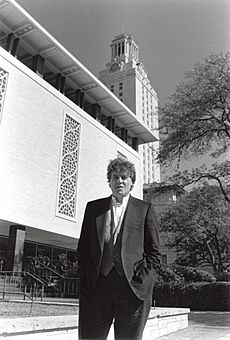
Tom Stoppard's important papers are kept at the Harry Ransom Center at the University of Texas at Austin. He started this collection in 1991, and it continues to grow. The collection includes his handwritten and typed drafts, notes, and revisions. It also has materials from his plays, like cast lists, set drawings, and photos. You can also find theatre programs, posters, letters, and awards there.
Tom Stoppard's Published Works
- Novel
- 1966: Lord Malquist and Mr Moon
- Theatre
- 1964: A Walk on the Water
- 1965: The Gamblers – based on the novel The Gambler by Dostoevsky
- 1966: Tango – adapted from Sławomir Mrożek's play
- 1966: Rosencrantz and Guildenstern Are Dead
- 1968: Enter a Free Man – developed from A Walk on the Water
- 1968: The Real Inspector Hound
- 1969: Albert's Bridge
- 1969: If You're Glad I'll Be Frank
- 1970: After Magritte
- 1971: Dogg's Our Pet
- 1972: Jumpers
- 1972: Artist Descending a Staircase
- 1974: Travesties
- 1976: Dirty Linen and New-Found-Land
- 1976: 15-Minute Hamlet
- 1977: Every Good Boy Deserves Favour – written for orchestra
- 1978: Night and Day
- 1979: Dogg's Hamlet, Cahoot's Macbeth
- 1979: Undiscovered Country – an adaptation of a play by Arthur Schnitzler
- 1981: On the Razzle – based on a play by Johann Nestroy
- 1982: The Real Thing
- 1982: The (15 Minute) Dogg's Troupe Hamlet
- 1983: English libretto for The Love for Three Oranges (opera by Sergei Prokofiev)
- 1984: Rough Crossing – based on a play by Ferenc Molnár
- 1986: Dalliance – an adaptation of Arthur Schnitzler's Liebelei
- 1987: Largo Desolato – a translation of a play by Václav Havel
- 1988: Hapgood
- 1993: Arcadia
- 1995: Indian Ink – based on his radio play In the Native State
- 1997: The Invention of Love
- 1997: The Seagull – a translation of the play by Anton Chekhov
- 2002: The Coast of Utopia – a trilogy of plays: Voyage, Shipwreck, and Salvage
- 2004: Enrico IV (Henry IV) – a translation of the Italian play by Luigi Pirandello
- 2006: Rock 'n' Roll
- 2010: The Laws of War – a contribution to a collaborative piece
- 2015: The Hard Problem
- 2020: Leopoldstadt
- Original works for radio
- 1964: The Dissolution of Dominic Boot
- 1964: 'M' is for Moon Amongst Other Things
- 1966: If You're Glad I'll be Frank
- 1967: Albert's Bridge
- 1968: Where Are They Now?
- 1972: Artist Descending a Staircase
- 1982: The Dog It Was That Died
- 1991: In the Native State
- 2012: Tom Stoppard Radio Plays (collection)
- 2013: Darkside
- Television plays
- A Separate Peace (1966)
- Teeth
- Another Moon Called Earth
- Neutral Ground
- Professional Foul
- Squaring the Circle
- 1970: The Engagement
- Film and television adaptation of plays and books
- 1975: Three Men in a Boat (BBC Television)
- 1975: The Boundary
- 1978: Despair – screenplay for the film
- 1979: The Human Factor – film adaptation
- 1985: Brazil – co-authored screenplay
- 1987: Empire of the Sun – first draft of screenplay
- 1989: Indiana Jones and the Last Crusade – final rewrite of screenplay
- 1990: The Russia House – screenplay
- 1990: Rosencrantz & Guildenstern are Dead – also directed
- 1998: Shakespeare in Love – co-authored screenplay
- 1998: Poodle Springs – teleplay adaptation
- 2001: Enigma – film screenplay
- 2005: Star Wars: Episode III – Revenge of the Sith – dialogue-polish
- 2005: The Golden Compass – a draft screenplay
- 2012: Parade's End – television screenplay
- 2012: Anna Karenina – film screenplay
- 2014: Tulip Fever – film screenplay
Images for kids
See also
 In Spanish: Tom Stoppard para niños
In Spanish: Tom Stoppard para niños
- List of British playwrights since 1950
- List of Academy Award winners and nominees from Great Britain
- List of Jewish Academy Award winners and nominees
- List of Golden Globe winners
 | Kyle Baker |
 | Joseph Yoakum |
 | Laura Wheeler Waring |
 | Henry Ossawa Tanner |


